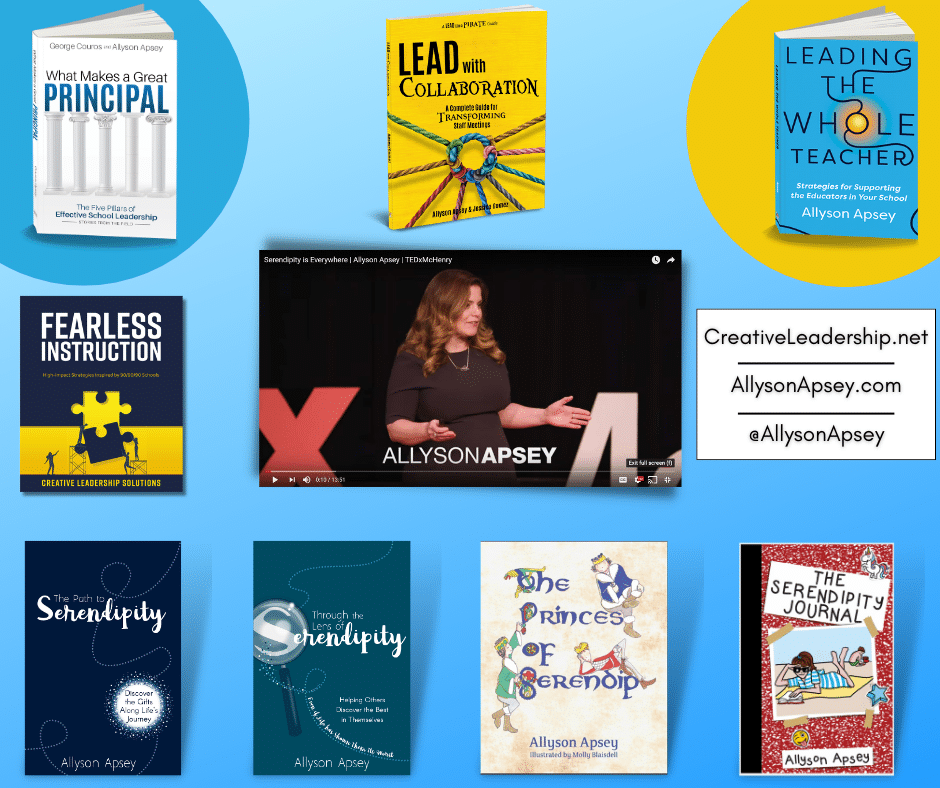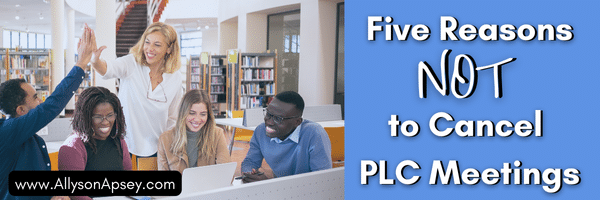Canceling PLCs might save time on the calendar, but it costs us so much more in the long run.
Research consistently shows that collaboration is one of the most powerful ways we can strengthen both teaching and learning, which is why I worry when I hear talk about canceling PLC meetings. I get it. Time is scarce, and educators are carrying so much. Sometimes the collaboration within PLCs doesn’t get the attention it needs to build the trust, transparency, and vulnerability that make it effective. And like many initiatives, PLCs may start strong but lose momentum as leadership changes or other priorities take over. When done well, PLCs are one of the most powerful ways we can support both teachers and students. Instead of canceling, let’s lean into them, refine them, and protect the time they give us to grow together.
Collaboration is the heartbeat of a school. We don’t want students to have one great year with one great teacher; we want them to experience excellence in every classroom, every year. And we need each other to make that happen. No matter what we call collaborative team meetings (PLCs, PLTs, TBTs, CLTs, etc.), the goal is the same: meaningful collaboration that strengthens every teacher’s practice and leads to better outcomes for students.
Here are five reasons we should not only keep PLCs on the schedule but elevate them to their full potential. Instead of canceling, let’s invest in them with professional learning, coaching, and support. Protecting this time nurtures one of the most powerful levers we have for school improvement. When done with purpose, PLCs become a catalyst for teacher growth, student success, and a thriving school culture.
- Collaboration fuels teacher satisfaction. When teachers feel part of a supportive, collaborative team, their job satisfaction rises. Collaboration helps refine instruction and reduces the sense of isolation that can creep into classrooms. Teachers who work in strong PLCs report greater joy, less stress, and higher levels of commitment to their schools. Recent findings from the Walton Family Foundation–Gallup Teaching for Tomorrow survey (2024) confirm this, showing that teacher collaboration is directly linked to higher satisfaction. Safeguarding PLC time is truly an investment in the well-being of our staff. 1
- Collective efficacy is real, and it’s powerful. Collective efficacy is the belief that, together, we can positively impact student outcomes. John Hattie’s research shows that it has one of the highest effect sizes on achievement. And this isn’t only true in schools. Across professions, from medicine to business to athletics, teams that believe in their shared capacity to succeed consistently outperform those who don’t. PLCs give us the structure to cultivate that belief in education, transforming what we think is possible for students. 2
- True teaming does not come naturally. Humans are often transactional in our interactions. We share information, offer compliments, complete tasks, and move on. But transformational teaming, where groups become greater than the sum of their parts, requires time, trust, and intentional effort. PLCs provide the structure for that kind of growth. Committing to PLCs preserves one of the best opportunities for teachers to grow into high-functioning, transformative teams.
- Our work is too hard to do alone. Teaching has always been a complex and demanding profession, and it has only grown more challenging in recent years. No educator should feel they must carry the weight of their classroom, their subject area, or their students’ challenges in isolation. PLCs remind us that we are not alone; we are part of a collective effort. Together, we can share resources, brainstorm strategies, and shoulder the work in ways that make the load lighter and the outcomes stronger.
- The answers are already in our schools—we just need to share them. Some of the best solutions to the challenges we face are already happening in classrooms just down the hall. When we share effective practices, such as using small-group reteaching to close gaps, designing more accurate and motivating assessments, or applying strategies that increase engagement among reluctant learners, we create a ripple effect that benefits every student. PLCs are the vehicle for uncovering and spreading those solutions. Honoring this time ensures that the voices of teachers, especially those closest to students, guide the path forward. This is particularly valuable for our newest teachers, as well as experienced teachers stepping into new roles or approaches. PLCs are among the most impactful professional learning opportunities we can provide.
Real-time data fuels real-time solutions, and PLCs make that possible.
Our actions show what we value, and valuing PLC meetings means protecting teacher well-being, student learning, and the belief that working together makes us stronger. Collaboration brings joy, collective efficacy fuels achievement, and shared effort lightens the load. PLCs also provide teachers with the opportunity to review real-time data together, empowering them to adjust instruction in the moment. Without this intentional time, we often fall back on high-stakes, summative data that can leave teachers feeling defeated. Real-time data fuels real-time solutions, and PLCs make that possible. Canceling PLCs may create space on a schedule, but investing in them creates growth, joy, and success. Let’s lean in, strengthen, and safeguard PLCs so every teacher and every student has the chance to thrive.
Collaboration is not extra; it is essential.
- Findings are from the Walton Family Foundation-Gallup Teaching for Tomorrow survey, conducted 10/29-11/25, 2024. https://news.gallup.com/poll/659567 ↩︎
- Hattie, J. (2023). Visible Learning: The Sequel. Routledge. ↩︎
Click here for a printable PDF of this article.

